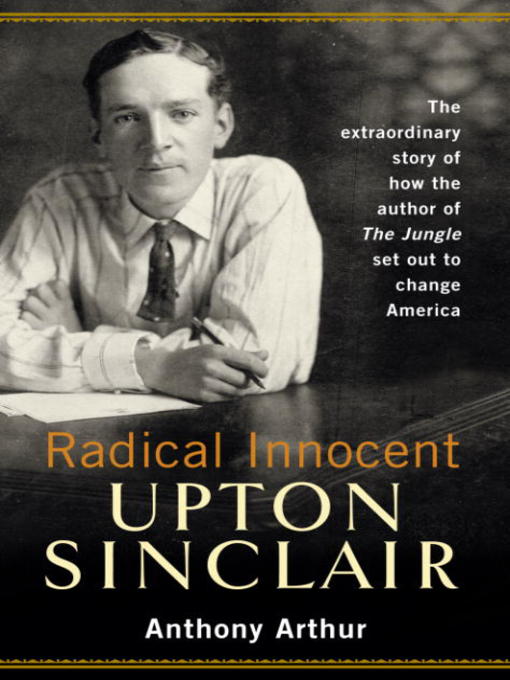
Radical Innocent
Upton Sinclair
کتاب های مرتبط
- اطلاعات
- نقد و بررسی
- دیدگاه کاربران
نقد و بررسی

March 13, 2006
A hundred years ago, 27-year-old Upton Sinclair became an overnight sensation with the publication of his novel The Jungle,
an indictment of the meatpacking industry that would usher in legislation like the Pure Food and Drug Act. The social reformer went on to shock his friends by leaving the American Socialist Party and winning the 1934 Democratic nomination for governor of California, although he lost the election. And at 65, despite a string of failed novels, the resilient author won the 1943 Pulitzer Prize for Dragon's Teeth
, the second in an 11-book series of historical novels featuring the hero Lanny Budd. Particularly interesting are the portrayals of Sinclair's friendships with luminaries like President Theodore Roosevelt, Sinclair Lewis and Albert Einstein; his ambitious experiments in communal living; and his shattering divorce from his first wife and estrangement from his son. Also noteworthy are his unsuccessful campaign for the Nobel Prize and his problematic business dealings with Russian film director Sergei Eisenstein. Arthur (Warring with Words: Famous Literary Feuds in America
) draws a well-researched, balanced and fascinating portrait of a self-centered feminist who didn't understand women, a muckraker whose naïveté left him constantly vulnerable to human treachery, and a complex, bestselling celebrity who was often dismissed as a propagandist by the literary establishment. 16 pages of b&w photos not seen by PW
.

April 15, 2006
This spring marks the centennial of the publication of Upton Sinclair's "The Jungle", an anniversary being noted with the publication of two new biographies of the prolific journalist, novelist, socialist, and politician. Both Mattson (contemporary history, Ohio Univ., Athens) and Arthur (literature, California State Univ., Northridge) make excellent use of previous scholarship and primary sources to examine the life of this muckraker and Pulitzer Prize -winning author, who became an icon of the Progressive Era. Yet they provide readers with two distinct perspectives on the man's life and times. Mattson seamlessly weaves the social, cultural, economic, and political events into his engaging biography, which expands on Floyd Dell's 1927 biography, "Upton Sinclair: A Study in Social Protest", as well as the autobiography Sinclair published in 1962. Arthur's book, on the other hand, focuses primarily on how Sinclair used political and personal events to develop his literary projects; Sinclair's writings, along with his political activism, were driven by the Progressive Era's ideals of improving life for ordinary Americans. Arthur's well-written book uses Sinclair's writing to provide a detailed and enlightening chronicle of his life. Both books enrich our knowledge of the life and times of Upton Sinclair and will do much to spur renewed interest in his literary works. Mattson's book is suitable for both academic and public libraries, while Arthur's book would be particularly welcome in academic collections." -Diane Fulkerson, Univ. of West Georgia, Carrollton"
Copyright 2006 Library Journal, LLC Used with permission.

Starred review from June 1, 2006
Upton Sinclair (1898-1968) wrote nearly 90 books, but the only title most readers can name is " The Jungle." Published a century ago, this indelible expose of the grotesquely cruel and unsanitary practices of Chicago's slaughterhouses made Sinclair famous, although the budding socialist intended to evoke sympathy for exploited workers, not instigate meatpacking reform. Near misses are an ongoing theme in Arthur's enlightening, frequently stinging biography as he describes Sinclair first as a bookish boy marked by his father's alcoholism, then as a "romantic idealist" with a fierce work ethic. Arthur organizes a vast amount of information into a fast-flowing, witty, and incisive narrative as he sets the political and artistic context for each of Sinclair's bold ventures and cogently explains why so many of Sinclair's ambitious books failed: he wrote too much too quickly, overburdened fiction with propaganda, and lacked "psychological sensitivity." Tireless and mercurial, Sinclair went after the oil industry, the press, and religion; self-published books commercial houses balked at; and ran for governor of California. Arthur does right by his demanding subject, deepening our understanding of Sinclair as impassioned, "eccentric and difficult," altruistic, and, in spite of his muckraking, curiously innocent.(Reprinted with permission of Booklist, copyright 2006, American Library Association.)

























دیدگاه کاربران